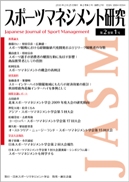Volume 2, Issue 1
Displaying 1-10 of 10 articles from this issue
- |<
- <
- 1
- >
- >|
Article
-
2010Volume 2Issue 1 Pages 3-17
Published: February 25, 2010
Released on J-STAGE: August 31, 2010
Download PDF (807K) -
2010Volume 2Issue 1 Pages 19-32
Published: February 25, 2010
Released on J-STAGE: August 31, 2010
Download PDF (530K) -
2010Volume 2Issue 1 Pages 33-45
Published: February 25, 2010
Released on J-STAGE: August 31, 2010
Download PDF (383K)
Research Note
-
2010Volume 2Issue 1 Pages 47-56
Published: February 25, 2010
Released on J-STAGE: August 31, 2010
Download PDF (809K)
International Conference Report
-
2010Volume 2Issue 1 Pages 57-62
Published: February 25, 2010
Released on J-STAGE: August 31, 2010
Download PDF (272K) -
2010Volume 2Issue 1 Pages 63-68
Published: February 25, 2010
Released on J-STAGE: August 31, 2010
Download PDF (777K) -
2010Volume 2Issue 1 Pages 69-74
Published: February 25, 2010
Released on J-STAGE: August 31, 2010
Download PDF (644K) -
2010Volume 2Issue 1 Pages 75-78
Published: February 25, 2010
Released on J-STAGE: August 31, 2010
Download PDF (837K)
Conference Report
-
2010Volume 2Issue 1 Pages 79-82
Published: February 25, 2010
Released on J-STAGE: August 31, 2010
Download PDF (226K) -
2010Volume 2Issue 1 Pages 87-127
Published: February 25, 2010
Released on J-STAGE: August 31, 2010
Download PDF (2355K)
- |<
- <
- 1
- >
- >|
